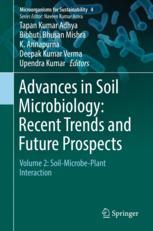

Most ebook files are in PDF format, so you can easily read them using various software such as Foxit Reader or directly on the Google Chrome browser.
Some ebook files are released by publishers in other formats such as .awz, .mobi, .epub, .fb2, etc. You may need to install specific software to read these formats on mobile/PC, such as Calibre.
Please read the tutorial at this link: https://ebookbell.com/faq
We offer FREE conversion to the popular formats you request; however, this may take some time. Therefore, right after payment, please email us, and we will try to provide the service as quickly as possible.
For some exceptional file formats or broken links (if any), please refrain from opening any disputes. Instead, email us first, and we will try to assist within a maximum of 6 hours.
EbookBell Team

5.0
68 reviewsThis book presents a comprehensive collection of articles illustrating the importance of microbial community structure and function for ecosystem sustainability and environmental reclamation. It addresses a diverse range of topics, including microbial diversity, physiology, genomics, ecosystem function, interaction, metabolism, and the fruitful use of microbial communities for crop productivity and environmental remediation.
In addition, the book explores issues ranging from general concepts on the diversity of microorganisms in soil, and ecosystem function, to the evolution and taxonomy of soil microbiota, with future prospects. It covers cutting-edge methods in soil microbial ecological studies, rhizosphere microflora, the role of organic matter in plant productivity, biological nitrogen fixation and its genetics, microbial transformation of plant nutrients in soil, plant-growth-promoting rhizobacteria, and organic matter transformation.
The book also discusses the application of microbes in biodegradation of xenobiotic contaminants. It covers bio-fertilizers and their role in sustainable agriculture and soil health, biological control of insect pests and plant pathogens, and the latest tools of omics in soil microbiology, i.e. genomics, proteomics, transcriptomics and metabolomics, which offer pioneering approaches to the exploration of microbial structure and function.